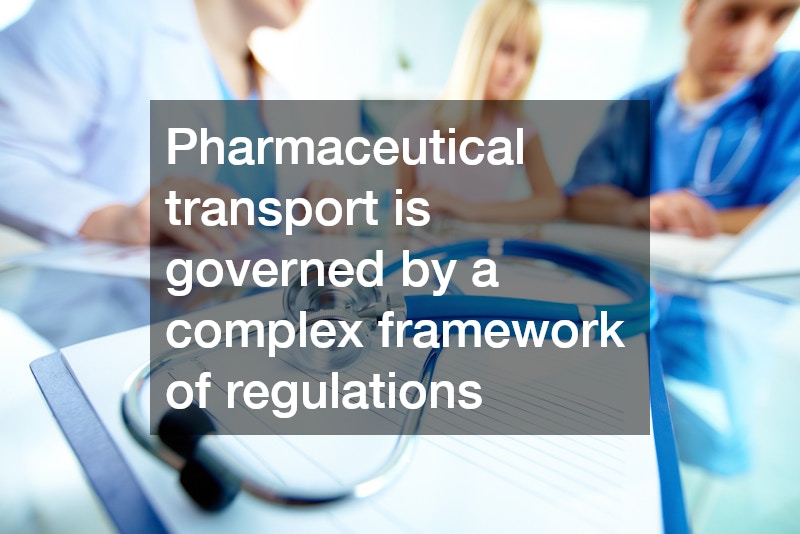There are many critical aspects of pharma transport within the medical field. Read on to learn its significance, challenges, and best practices. The global pharmaceutical supply chain is intricate, encompassing the journey of drugs from manufacturers to patients.
Ensuring that pharmaceuticals are transported safely and efficiently is paramount for patient safety and the efficacy of treatments. In an era where precision medicine and fast delivery are increasingly valued, a deeper understanding of pharmaceutical transport is essential.
What is Pharma Transport and Why is it Important?
Pharmaceutical transport refers to the processes involved in the movement of pharmaceutical products from one location to another. It encompasses various methods and procedures tailored to protect the integrity of the products during transit. This is particularly important for temperature-sensitive medications, such as vaccines and biologics, which can lose potency if exposed to unsuitable conditions. Effective pharma transport plays a crucial role in the distribution network, as it ensures that patients receive medications in their intended state, thus maintaining the overall healthcare ecosystem.
The significance of pharma transport cannot be overstated, as it directly correlates with patient outcomes. A breakdown in the supply chain can lead to shortages of essential medications, affecting countless individuals who rely on these treatments. Furthermore, the rise of global markets has increased the complexity of maintaining appropriate conditions across diverse geographies. Therefore, understanding the importance of precise pharma transport is essential for all stakeholders in the healthcare supply chain.
Ultimately, proper pharmaceutical transport fosters trust in the healthcare system. When healthcare providers and patients are assured of the quality and efficacy of the medications they use, it encourages adherence to treatment protocols. Enhancing the awareness around pharma transport underpins a fundamental aspect of healthcare delivery and patient welfare, making it an essential component of the medical field.
What Regulations Govern Pharmaceutical Transport?
Pharmaceutical transport is governed by a complex framework of regulations aimed at ensuring the safety and efficacy of medications throughout their journey. In the United States, organizations such as the Food and Drug Administration (FDA) set forth stringent guidelines that dictate specific temperature ranges and handling procedures for various pharmaceutical products. Similar regulations are established by other health authorities globally, reflecting the universal recognition of the importance of safeguarding pharmaceuticals.
Compliance with these regulations involves meticulous documentation, rigorous training, and regular audits to ensure that all procedures are consistently followed. Failure to comply can result in significant penalties, including fines and the potential recall of affected medications. This reinforces the necessity for all stakeholders, including manufacturers, distributors, and healthcare facilities, to stay informed about current regulations and best practices in pharmaceutical transport.
Additionally, these regulations often require modern tracking and reporting systems to monitor conditions during transport, giving real-time data that can be utilized for audits or investigations. The establishment and adherence to these regulations not only protect patients but also enhance the overall integrity and reliability of the pharmaceutical supply chain, making them indispensable in the medical field.
What are the Risks Associated with Improper Pharma Transport?
The risks of improper pharmaceutical transport can have far-reaching consequences, influencing patient safety and health outcomes. One of the most significant risks is the potential degradation of medications due to exposure to extreme temperatures or humidity levels. This degradation can lead to medication that is less effective or even harmful to patients, putting lives at risk and leading to adverse health outcomes.
Beyond risks to patients, improper transport can also lead to financial burdens for healthcare organizations. Recalls of compromised medications create logistical challenges, as organizations are often required to perform extensive investigations, notify patients, and dispose of affected drugs. These actions not only incur costs but can also damage the reputation of institutions involved and erode patient trust.
Moreover, the potential regulatory repercussions of improper pharma transport cannot be overlooked. Regulatory bodies frequently impose strict penalties for non-compliance, including fines and potential criminal charges for gross negligence. These risks underline the urgent need for organizations to have robust systems in place to monitor and ensure compliance during pharmaceutical transport.
How Can Technologies Improve Pharma Transport?
The integration of technology in pharmaceutical transport has revolutionized the way drugs are managed throughout the supply chain. Smart tracking systems, such as RFID and IoT devices, allow for real-time monitoring of temperature and humidity, ensuring that pharmaceuticals remain within set parameters during transit. This technological advancement not only enhances security but also provides peace of mind for stakeholders involved in the supply chain.
Additionally, data analytics and machine learning algorithms have made it possible to predict and mitigate potential disruptions in the transport process. By analyzing historical data, organizations can identify patterns and establish contingency plans, effectively improving the overall resilience of the supply chain. This proactive approach to managing risks associated with pharmaceutical transport is transforming the landscape of healthcare logistics.
Moreover, automation and robotics are streamlining operations within warehouses and distribution centers. Automated systems can increase efficiency, reduce errors, and enhance overall safety when handling pharmaceuticals. By embracing these technological advancements, organizations can not only improve compliance with regulations but also foster a safer and more effective pharmaceutical transport system.
What Best Practices Should Be Followed in Pharma Transport?
Implementing best practices in pharmaceutical transport is crucial for ensuring the integrity of medications from manufacturer to patient. First and foremost, training programs for all personnel involved in drug handling and transport should be established. These programs should cover the specific requirements for different types of pharmaceuticals and the regulations governing them. A well-trained staff can significantly reduce the risk of human error during transport, enhancing safety and compliance.
Second, utilizing validated shipping methods and packaging materials is essential. This includes the use of temperature-controlled containers for sensitive pharmaceuticals, ensuring that they remain within specified ranges during transit. Additionally, documenting every step of the transport process contributes to accountability, allowing organizations to trace any issues back to their source quickly and provide solutions.
Lastly, fostering a culture of continuous improvement is vital. By regularly reviewing transport processes and outcomes, organizations can identify areas for enhancement and adapt to new regulations or technologies. Engaging in industry forums and collaborating with other stakeholders can provide valuable insights and encourage the sharing of best practices, ultimately leading to improved pharmaceutical transport standards across the board.
The importance of proper pharmaceutical transport in the medical field cannot be overstated. The integrity of medications is critical for patient safety, and lapses in transport practices can lead to significant health risks and regulatory penalties. By understanding the regulations governing pharma transport, the risks associated with non-compliance, the advancements in technology, and following best practices, healthcare organizations can ensure that they contribute positively to patient outcomes. A concerted effort towards improving pharma transport practices will ultimately enhance the reliability of the healthcare supply chain, safeguarding patient health and promoting trust in medical treatments.


